[ad_1]
“Do you know that for the last 15 minutes, you have been talking non-stop about composting? I’ve just had a long day at the office and wanted to have a relaxing conversation with you,” she said. I was on the phone to a close family member, who lives in London.
That’s when I suddenly realised that Ashok Kumar’s love interest in Khoobsurat (1980) was authentic. For those of you who haven’t watched it, much of the action in that popular film emerges from Rekha’s attempts to liberate the members of her sister’s marital family from the clutches of their control freak matriarch played by Dina Pathak. Towards that end, Rekha’s character tries to find out what each family member is passionate about. His son reveals that Ashok Kumar, who plays Pathak’s husband, seems to be more captivated by manure than anything else and that he talks about it incessantly to everyone he meets. I found that a weird quirk when I watched the film all those years ago. But manure is a legitimate interest for me now. I too talk about compost all the time.
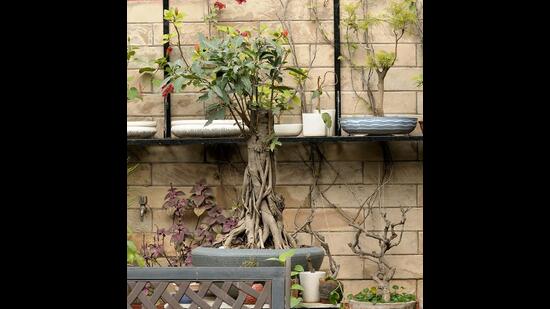
It wasn’t love at first sight. My manure obsession was one of those rarest of rare positive side effects of the Covid pandemic. As a result of the lockdown, the garbage collector’s visits to the lane where I live became erratic. I had no domestic help to support me as dry leaves collected in my garden every day. Around that time, I discovered multiple videos on soil conditioning on YouTube. What started as an innocuous crush on compost grew into a full-bodied love affair.
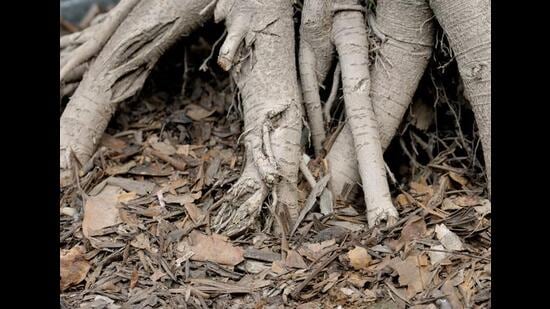
Remember Shah Rukh Khan’s famous lines from Om Shanti Om? “Kehte hain agar kisi cheez ko dil se chaho to poori kaaynnat usse milane ki koshish mein lag jaati hai.” Roughly translated it means: “When you want something with all your heart, the universe conspires to help you get it.” Things were somewhat similar during my composting journey: on most days, the direction of the wind ensured that lots of leaves from across the neighbourhood landed in my garden. The leaves from the giant peepal outside my neighbour’s house, those from the schefflera and the neem down the lane, and from the giant cedars beautifying the house next door all preferred that my garden be their last resting place. All those dry leaves pushed me to fall in love with composting. It was a low maintenance affair. I had to spend just a few minutes in the garden in locked-down Delhi’s wonderful pollution-free air to maintain the relationship. That pristine air was yet another rare unexpected positive side effect of the pandemic.
If my romance with compost was a full blown one, my feelings for kitchen waste were quite platonic. I mean I was close to it but not too close. Holes were made in the floor and sides of empty plastic and metallic bins, which were gradually filled with three portions of dry leaves kissing a portion of wet kitchen waste. It would take four to six weeks to produce a happy bin of fertilizer that was fibrous, nutritious and did not smell at all.
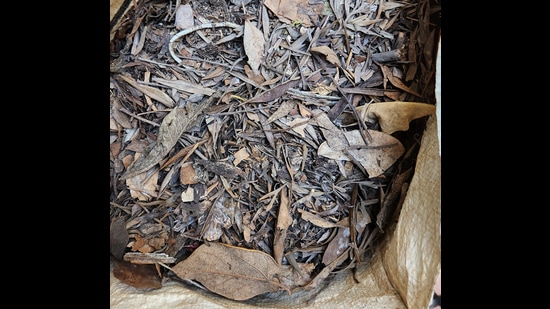
Clearly, a gentle kiss in the beginning had led to a made-for-each other relationship between the wet and dry portions. Sometimes, I added a bit of microbe powder to spice up things. The resultant rough and tough black-brown compost had to be trained a little to enter the civilised world of my plants. The fine sophisticated bits were used to enrich the bonsais and other ornamentals while the rougher portions were used for mulching the pots during peak summer and in the harsh winter to save vulnerable and delicate plant roots. My love story was gradually enriching the lives of my plant babies.
At this point of our enforced confinement when many were bragging online about sourdough breads and Bologna coffee, I kept nurturing my own passion. Opening the compost bin after four weeks provided me with a Munna Bhai MBBS moment. While watching that blockbuster for the tenth time, I heard Sanjay Dutt tell the sweeper: “Tum bohot mast kaam karta hai, Maqsood Bhai; tum sabka kachrapatti saaf karta hai aur koi aapki tareef nahin karta.” (You do an amazing job, brother Maqsood, of cleaning up the mess and dirt, but no one gives you any credit for it.”
It felt like Dutt was talking about my compost! Everyone appreciates the flowers, the coloured leaves; no one talks about the dirt, the humus that nourishes all that beauty.
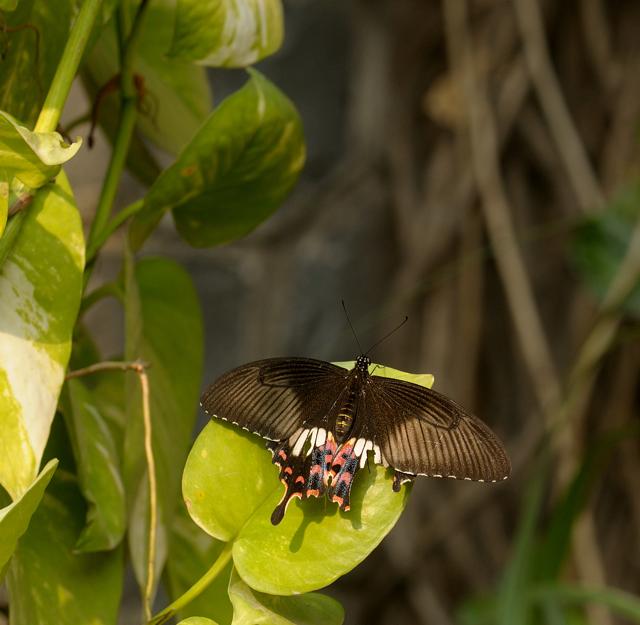
The result of my composting affair was soon visible. While repotting my plant, I jumped at the sight of earthworms. It was evidence, at long last, that my soil was eco-friendly, gentle and was loved by other creatures of the world. It was well behaved and I was proud to have trained it so successfully. Sighting an earthworm in a flower pot might not sound as exciting as seeing a tiger in a jungle but it definitely gave me at least as much pleasure as watching a spotted deer in the wild.
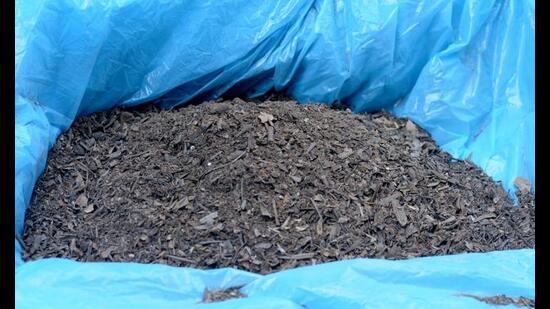
Lockdowns are hopefully a thing of the past (fingers firmly crossed after all the bad news coming in from China) and my gardener and the garbage collector are back. But they won’t be able to drive a wedge between me and my love interest. My affair with mulch continues. No villain is allowed to cast an evil eye on the dry leaves in my garden, not even on those that fall outside the garden walls. The street sweeper leaves a heap of them outside my gate.These outside leaves need to be trained a little about the culture of our house before they enter my compost bin and a heavy hand has to be used to deal with the gutkha (tobacco) pouches and other foreign elements in the pile.
But these extraneous irritants cannot diminish my ardour. Compost and I are now joined together in a fine forever love story.
Prerna Jain is an artist and photographer based in New Delhi. An extensive collection of her work can be found at her website www.prernasphotographs.com and at facebook.com/prernasphotographs. She is the author of My Feathered Friends.
This winter season, get Flat 20% Off on Annual Subscription Plans
Enjoy Unlimited Digital Access with HT Premium

[ad_2]
“Do you know that for the last 15 minutes, you have been talking non-stop about composting? I’ve just had a long day at the office and wanted to have a relaxing conversation with you,” she said. I was on the phone to a close family member, who lives in London.
That’s when I suddenly realised that Ashok Kumar’s love interest in Khoobsurat (1980) was authentic. For those of you who haven’t watched it, much of the action in that popular film emerges from Rekha’s attempts to liberate the members of her sister’s marital family from the clutches of their control freak matriarch played by Dina Pathak. Towards that end, Rekha’s character tries to find out what each family member is passionate about. His son reveals that Ashok Kumar, who plays Pathak’s husband, seems to be more captivated by manure than anything else and that he talks about it incessantly to everyone he meets. I found that a weird quirk when I watched the film all those years ago. But manure is a legitimate interest for me now. I too talk about compost all the time.

It wasn’t love at first sight. My manure obsession was one of those rarest of rare positive side effects of the Covid pandemic. As a result of the lockdown, the garbage collector’s visits to the lane where I live became erratic. I had no domestic help to support me as dry leaves collected in my garden every day. Around that time, I discovered multiple videos on soil conditioning on YouTube. What started as an innocuous crush on compost grew into a full-bodied love affair.

Remember Shah Rukh Khan’s famous lines from Om Shanti Om? “Kehte hain agar kisi cheez ko dil se chaho to poori kaaynnat usse milane ki koshish mein lag jaati hai.” Roughly translated it means: “When you want something with all your heart, the universe conspires to help you get it.” Things were somewhat similar during my composting journey: on most days, the direction of the wind ensured that lots of leaves from across the neighbourhood landed in my garden. The leaves from the giant peepal outside my neighbour’s house, those from the schefflera and the neem down the lane, and from the giant cedars beautifying the house next door all preferred that my garden be their last resting place. All those dry leaves pushed me to fall in love with composting. It was a low maintenance affair. I had to spend just a few minutes in the garden in locked-down Delhi’s wonderful pollution-free air to maintain the relationship. That pristine air was yet another rare unexpected positive side effect of the pandemic.
If my romance with compost was a full blown one, my feelings for kitchen waste were quite platonic. I mean I was close to it but not too close. Holes were made in the floor and sides of empty plastic and metallic bins, which were gradually filled with three portions of dry leaves kissing a portion of wet kitchen waste. It would take four to six weeks to produce a happy bin of fertilizer that was fibrous, nutritious and did not smell at all.

Clearly, a gentle kiss in the beginning had led to a made-for-each other relationship between the wet and dry portions. Sometimes, I added a bit of microbe powder to spice up things. The resultant rough and tough black-brown compost had to be trained a little to enter the civilised world of my plants. The fine sophisticated bits were used to enrich the bonsais and other ornamentals while the rougher portions were used for mulching the pots during peak summer and in the harsh winter to save vulnerable and delicate plant roots. My love story was gradually enriching the lives of my plant babies.
At this point of our enforced confinement when many were bragging online about sourdough breads and Bologna coffee, I kept nurturing my own passion. Opening the compost bin after four weeks provided me with a Munna Bhai MBBS moment. While watching that blockbuster for the tenth time, I heard Sanjay Dutt tell the sweeper: “Tum bohot mast kaam karta hai, Maqsood Bhai; tum sabka kachrapatti saaf karta hai aur koi aapki tareef nahin karta.” (You do an amazing job, brother Maqsood, of cleaning up the mess and dirt, but no one gives you any credit for it.”
It felt like Dutt was talking about my compost! Everyone appreciates the flowers, the coloured leaves; no one talks about the dirt, the humus that nourishes all that beauty.

The result of my composting affair was soon visible. While repotting my plant, I jumped at the sight of earthworms. It was evidence, at long last, that my soil was eco-friendly, gentle and was loved by other creatures of the world. It was well behaved and I was proud to have trained it so successfully. Sighting an earthworm in a flower pot might not sound as exciting as seeing a tiger in a jungle but it definitely gave me at least as much pleasure as watching a spotted deer in the wild.

Lockdowns are hopefully a thing of the past (fingers firmly crossed after all the bad news coming in from China) and my gardener and the garbage collector are back. But they won’t be able to drive a wedge between me and my love interest. My affair with mulch continues. No villain is allowed to cast an evil eye on the dry leaves in my garden, not even on those that fall outside the garden walls. The street sweeper leaves a heap of them outside my gate.These outside leaves need to be trained a little about the culture of our house before they enter my compost bin and a heavy hand has to be used to deal with the gutkha (tobacco) pouches and other foreign elements in the pile.
But these extraneous irritants cannot diminish my ardour. Compost and I are now joined together in a fine forever love story.
Prerna Jain is an artist and photographer based in New Delhi. An extensive collection of her work can be found at her website www.prernasphotographs.com and at facebook.com/prernasphotographs. She is the author of My Feathered Friends.
This winter season, get Flat 20% Off on Annual Subscription Plans
Enjoy Unlimited Digital Access with HT Premium

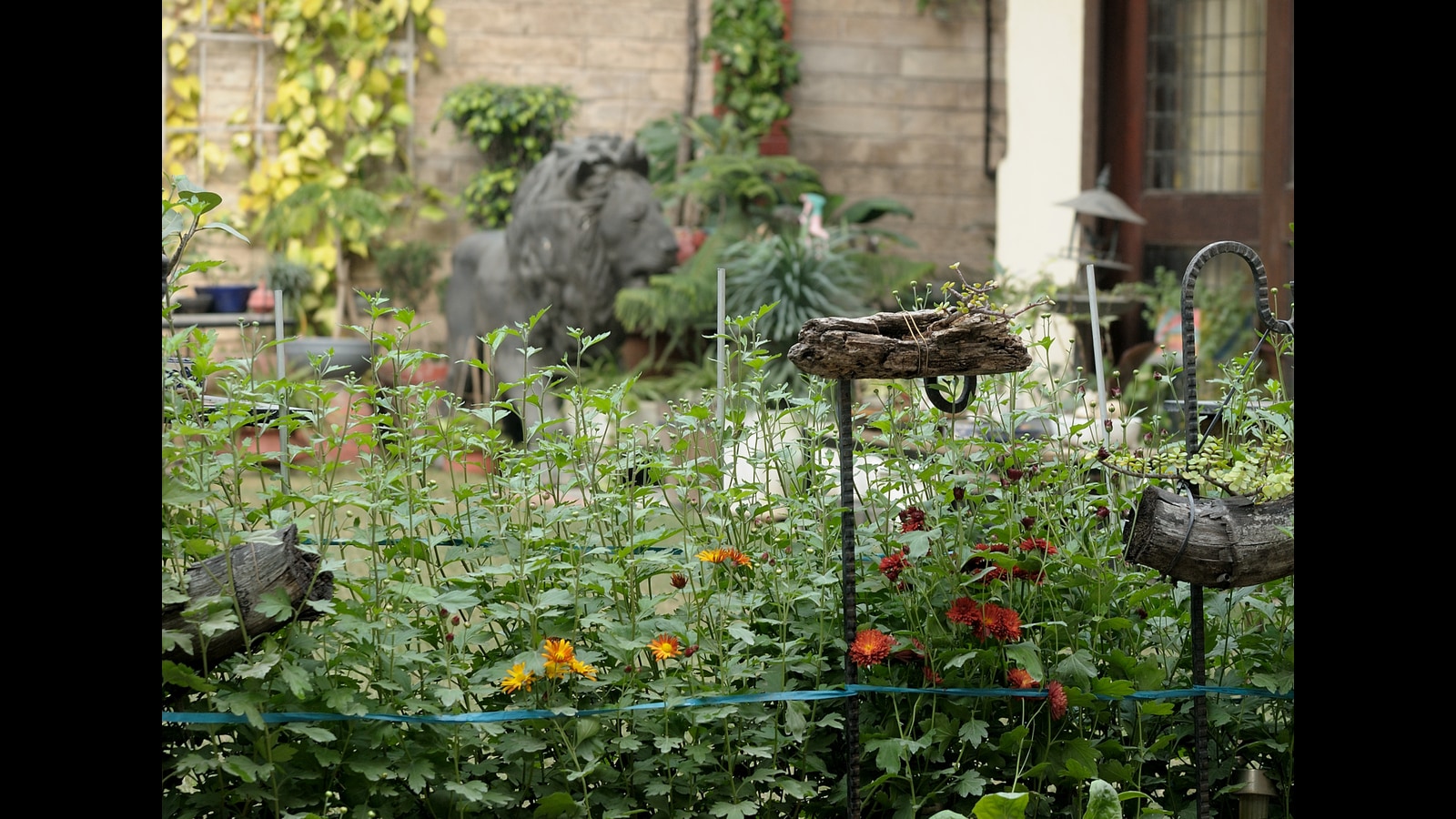

Leave a Reply